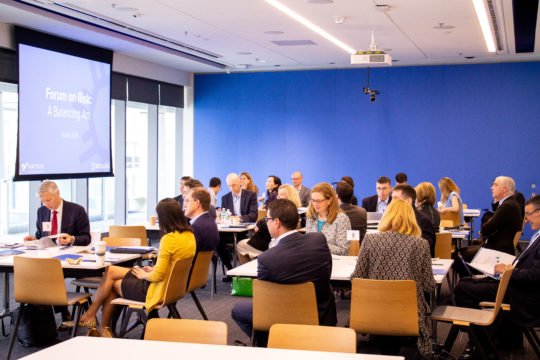
Discussions shed light on ways to manage multi-horizon risk and create long-term value

Discussions shed light on ways to manage multi-horizon risk and create long-term value
On 30 May, FCLTGlobal Members and guests met in Boston for a peer-to-peer discussion on managing risk to support long-term value creation. The Forum on Risk: A Balancing Act provided a venue for participants to exchange examples of multi-horizon risk management, including successes in practical applications and challenges with implementation.
To open the event, FCLTGlobal CEO Sarah Williamson emphasized the importance of handling near-term situations to preserving a fund’s ultimate long-term objective.
“Managing risk in a way that serves a long-term purpose means building a strategy that can get you there, anticipating the uncomfortable places that strategy may take you along the way, and planning for how you’ll handle those them when they arise,” said Williamson
With an eye towards participation and engagement, the forum included six sessions, summarized below, with attendees discussing the issues in smaller groups before sharing takeaways with the entire room.
Risk Oversight by Trustee Boards
The gathering also celebrated the contributions of prior working group participants to FCLTGlobal’s recently published report, Balancing Act: Managing Risk Across Multiple Time Horizons. A focal point of that report was strong communication on risk management between boards and staff. In the first session, participants shared their experiences in boards’ risk oversight sessions, including ways that they create a common information baseline, build appetites to take certain long-term risks, and anticipate board-level responses when risk materializes. Key takeaways included:
Risk Provisions in Owner-Manager Mandate Agreements
The morning session concluded with a focus on investment mandates’ risk provisions, where participants considered provisions that could be included in mandate agreements to ensure that asset owners and managers communicate, measure, and anticipate risk in a long-term way. Key takeaways included:
Hear from our Members about the importance of strategic risk practices and processes:
The lunch hour included an in-depth discussion with Sarah Williamson and MIT’s The Engine, an enterprise designed to support new companies working on scientific and technological innovation. The pair discussed how investors can support technologies with limited short-term revenue potential but tremendous long-term disruptive power. Most venture capital arrangements envision a ramp-up window of about 5-7 years before payout, which is too short for some transformative efforts. Providing long-term capital, knowledge, network connections, and specialized equipment can help companies advance to the point where they may be attractive to VC investors or public markets. Long-term initiatives, like The Engine and others, may be a natural fit for investors with long-term liabilities, like pension funds.
Climate Change and Carbon Risk
The afternoon kicked off with a conversation on climate and carbon risk. Many of today’s long-term-oriented investors are pioneering ways to address this risk, from measurably reducing portfolios’ carbon footprint to allocating assets in a way that earns a long-term return while advancing climate-related Sustainable Development Goals. In this session, participants exchanged the latest information about their methods for and insights on managing climate risk, including:
Taking Action: Application in FRM Certificate and GIPS Compliance
In a penultimate “lightning round”, a small panel of guests discussed the conclusions they’ve reached while refining traditional metrics to better suit long-term risk management:
Reputational Risk
The final workshop of the day dealt with reputational risk. An asset owner’s responsibility for the reputation of the fund sponsor is vital and complex. Similarly, an asset manager’s reputation affects their ability to earn and maintain mandates from asset owners. In this session, participants explored the practical, long-term implications of reputational risk, including how to anticipate and communicate its impact. Key learnings included:
The Forum on Risk was designed to focus on practicality. As such, our discussions shed light on practical ways to manage multi-horizon risk with an eye towards long-term value. They key learnings revealed over the course of the day will both inform FCLTGlobal’s research and shape our collective outlook on risk management moving forward. Thank you to Natixis Investment Managers for generously hosting the event, and to all of our speakers, presenters, and guests who made our agenda so engaging.
To learn more about our research on long-term portfolio risk, please refer to our recent work, Balancing Act: Managing Risk Across Multiple Time Horizons. For updates on new and upcoming work from FCLTGlobal, follow on social media @FCLTGlobal.